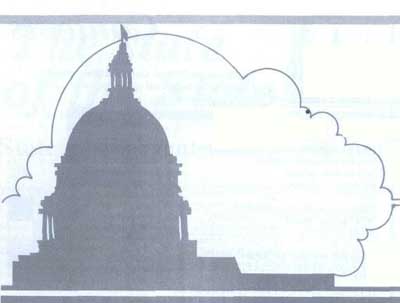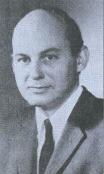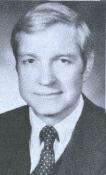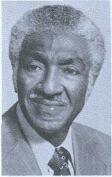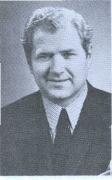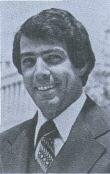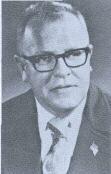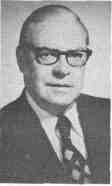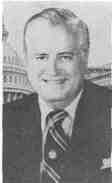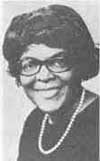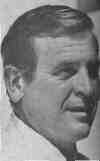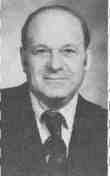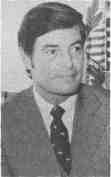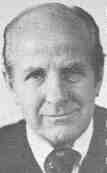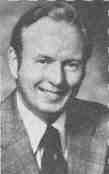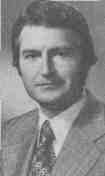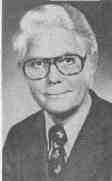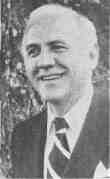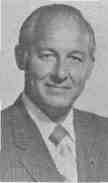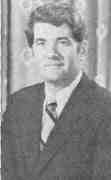By MARK GRUENBERG
WITH the November election rapidly approaching, Washington speculation has focused on the political makeup of the 96th Congress. The speculation, of course, has been intensified by the unknown effects of the tax revolt, but the comeback prospects of the GOP and whether the election will be a "referendum" on the performance of the incumbent President, are, as always, discussed endlessly. Everyone, in short, talks about the electability of members of Congress and overlooks their performance. What follows is a series of profiles of Illinois delegation members — focusing on their roles on key committees, their reputations, their strengths and weaknesses and, where possible, their ambitions and prospects. The emphasis is on performance, since power and influence in the Congress may not always be measured by merely tabulating contributions to committees or to specific legislation. These profiles are gleaned from independent group analyses, interviews with peers and observers, studies of specific activities and other sources which might shed light on the overall effectiveness and influence of a senator or representative. The Senate has often been called the most exclusive club in the world; there are, after all, only 100 members. But there is also a club within the club, consisting of the movers and shakers of the Senate, the ones who determine the mood, pace and often the policies and enactments of that body. Under majority leader Robert Byrd (D., W. Va.), the inner club appears to be enjoying a resurgence. For different reasons, both Illinois senators seem to be members of it. The Senate Adlai E. Stevenson III (D.), who has the stronger membership, derives it not from any particular legislative achievements, but from his allies and his integrity. His key ally, Byrd, has entrusted him with two sensitive tasks in the past year: guiding the Stevenson reform of the Senate's chaotic committee structure through the shoals of special interest groups and powerful committee chairmen who favored the status quo; and chairmanship of the Senate Ethics Committee at a time of rising concern about congressional scandals. The committee reorganization plan survived almost intact, a tribute to Stevenson's hard work and influence. And Byrd and his colleagues trust his integrity well enough to let him have free rein in the Ethics assignment. They know he won't go for grandstand plays or fancy speeches; Stevenson admits he dislikes speechmaking and cannot match his father's wit. But his honesty, tact and hard work lead to trust by others and, as a result, bring him into the inner club. Charles H. Percy (R.), too, is fast becoming a member of the club, but for entirely different reasons. He is, in Senate parlance, a "swing vote" and thus someone to be assiduously courted. Percy, thanks to a capable staff, is also one of the most well-prepared senators on the floor. The combination of his thoughtfulness and swing vote produces a senior senator who sources say is 4/September 1978/Illinois Issues often listened to by his peers. The results show in the quantity and range of successful legislation he has either sponsored or cosponsored. Percy's "swing vote" position comes from his membership in a dwindling band of liberal and moderate Senate Republicans. These liberal GOP members often provide the Democratic majority with key votes and help counteract Democratic defections. In return, Percy and other liberal Republicans are listened to on key legislation. For example, aided by efforts of the State of Illinois Washington office, Percy convinced Senate Finance Committee chairman Russell B. Long (D., La.) to attach an amendment to President Carter's energy bill which would benefit Illinois to the tune of $72 million (see "Washington," page 35), Percy has also made his voice heard on the issue of base closings in Illinois, and, in the process, made the Carter administration aware that it ignores the GOP liberals at its peril. "Carter likes to ignore the minority," one source said in explaining why Percy appeared to have a delayed and lukewarm reaction to the initial announcement of the base closings. Percy and the others have since set Carter straight, especially after providing him key votes on the Middle East aircraft sale to Israel, Saudi Arabia and Egypt and on ratification of the Panama Canal treaties. The House The records of the Illinois delegation of U.S. representatives are not as well-known as those of the two influential senators. Many of the Illinois members of the House are active, ambitious and relatively powerful. Other less visible and influential members are reelected time after time but appear to have neither ambition nor the prestige of representatives like Anderson, Rostenkowski, Michel, Price and Simon. Ralph Metcalfe, Chicago (D., 1st District), it seems, has disappointed his allies on Capitol Hill this year. Several say that as the only Chicago Democrat with a power base independent of the Cook County Democratic Organization, Metcalfe could vote his own conscience and be much more outspoken in favor of the interests of his overwhelmingly black constituency. Instead, Metcalfe has kept a relatively low profile in the Black Caucus, the Merchant Marine Committee and on the Commerce Committee — save for one odd anti gun control vote on a minor bill and his proxy vote to deregulation advocates on natural gas pricing. He even passed up a golden opportunity to glean publicity from his chairmanship of the Merchant Marine Panama Canal subcommittee during the Panama Canal debate.
Morgan F. Murphy, Chicago (D., 2nd District), has one of the most potentially powerful posts in the entire delegation: along with John B. Anderson (R., Rockford), he sits on the House Rules Committee. Before any bill can go to the floor of the House (save for suspension of the rules which requires a two-thirds affirmative vote), it must first pass scrutiny in the Rules Committee. The panel has total power to put any measure on — or off — the House floor schedule. Rules has great power to shape legislation. It decides how many amendments can be offered to a bill, who can offer them, what their content may be, and how long both the bill and the amendments can be debated. With all that potential power, Murphy, according to some sources, has been cautious about using it. He generally votes with the Democratic House leadership, except where he feels it conflicts with the city's interests or his own. Murphy was one of the leaders last year in the House against restrictions on disclosure or limitation of outside earned income by members of Congress. Scared by the Koreagate scandal involving influence-peddling by Tongsun Park, many House members voted for a 15 per cent (now $8,625) limit on outside earned income. Murphy, who disclosed he earned $140,000 from his law practice last year (the last year before the new limits went into effect), objected; privately, many members of Congress agreed with him.
Indeed, the new ethics code may soon prove a test of Murphy's Rules Committee role. Eventually the House is scheduled to write the code into federal law, complete with criminal and civil penalties for violation. But to do so, the bill will have to come before Murphy and Rules. It is unknown whether Murphy will put his own interests (net worth of $750,000, according to House financial statements) ahead of the formidable reform movement to clean up the House. Martin Russo, South Holland (D., 3rd District): To some extent, the jury is still out on Marty Russo. Several sources say that after an unexpected "free ride" this November, they expect him to assert himself more. Russo has been particularly concerned with the problems of small businessmen during this term. He has chaired several hearings exploring the impact of federal government activities, rules and regulations on small business, but has yet to make a vigorous legislative push on the subject. Several liberal organizations in Washington are upset with his apparent attempts to neutralize business opposition in what was supposed to be a Republican district, especially his vote in July in the House Commerce Committee to gut Carter's hospital cost control plan. Edward J. Derwinski, Flossmoor (R., 4th District), has recently found himself in a rather odd position: both President Carter and the GOP approve of what he is doing. As ranking minority member of the Post Office and Civil Service Committee, Derwinski for years has been leading an "economy-in-government" September 1978 / Illinois Issues/5 fight to curtail the burgeoning pay and size of the federal government. He led the floor fight against a bill opposed by the Carter administration which boosted 11,500 federal workers' (firemen) pay. The Democrats wouldn't touch the measure, and the rest of the GOP cheered him on. Economy-in-government is a tried and true Republican dogma. Derwinski has also become famous for his travels. He is annually among Congress' leading junketeers, and insists he has learned much from his travels. He also defends them on the floor, declaring last year that "I consider the word 'junket' not a dirty word, but a badge of honor."
John G. Fary, Chicago (D., 5th District), of all the members of the delegation, appears to have the least influence. He is a junior member of the Public Works Committee with a bent towards pork-barrel construction projects which wind up under fire both in Washington and Illinois. One charitable source even says, "We don't bother to contact him before a vote; we know which way he's going to go — whatever instructions he gets from Rostenkowski." An uncharitable source close to the delegation calls him "an embarrassment." In one of his monthly columns, Rep. Paul Simon, Carbondale (D.,24th District), described Fary as "the quietest member of the Illinois delegation." Henry Hyde, Park Ridge (R., 6th District) has done what few do. As a sophomore member of the House, he has made a great impact on national policy. By successfully attaching the so called "Hyde Amendment" to the appropriations bill for the Department of Health, Education and Welfare, Hyde has successfully stopped federal funding of abortions via Medicaid in all but a few instances. And by insisting on the tough wording of his amendment despite tremendous pressure from the Senate and from the House Democratic leadership, Hyde has also shown his mettle under fire. The old dictum of to-get-along-go-along does not apply to Hyde. Washington observers from all ends of the spectrum caution that Hyde is not, however, a one-issue member. One Hill source who disagrees with Hyde on practically everything still calls him "bright and well-informed. If the GOP had more votes, he'd really be a power in the House."
Cardiss Collins, Chicago (D., 7th District), is another member with unfulfilled potential, according to many sources. Aside from sponsoring several housing bills relating to Chicago, she is praised for little else than constituent service. Several Chicago sources have said that the late Mayor Richard J. Daley was upset with her excessive foreign travel, but apparently the differences were patched over. Daniel Rostenkowski, Chicago (D., 8th District), is the most powerful member of the Illinois House delegation, and the one with the brightest prospects. As chief deputy majority whip, Rostenkowski has developed an uncanny reputation for accurate nose counts on key Capitol Hill issues. That, and a well-deserved reputation for bluntness, make him one of the few people who can say "no" to President Carter and still be reinvited to leadership breakfasts and policy planning sessions. Rostenkowski is also described by many sources as the most consistent communications link within the delegation. He keeps up contacts with all the Chicago Democrats, the other Illinoisans on the Ways and Means Committee (Mikva, Crane) plus Downstate representatives such as Simon and Shipley. Two sources mentioned that Rostenkowski was a catalyst in a successful effort to get $132 million for funds for the controversial Crosstown Expressway. He brought together Shipley, Yates, Michel, O'Brien and some of the Chicago members to initiate a series of vote tradeoffs on the Crosstown. The Downstate members supported the Crosstown in return for either Chicago-area support of repairs on U.S. Highway 51, or construction of the St. Louis Airport (which would be built in Illinois) or cheap air fares between St. Louis and Chicago Midway. Appropriations then pulled the money from other future projects in order to fund the Crosstown. The only question about Rostenkowski is where he goes from here. At 50, with 20 years seniority, he has a number of possible options. Barring cataclysm, he should be chairman of the tax-writing House Ways and Means Committee within the next few years. His whip post gives him an eventual shot at the speakership. And there is always the recurring Rostenkowski-for-mayor rumor, which is again making the rounds here, a year before the next Chicago election. Nobody is sure which way Rostenkowski will go, but it must be nice to have such possibilities. Sidney Yates, Chicago (D., 9th District), according to all sources, is "one of the most respected members in the entire House of Representatives."In a quiet way, Sid Yates is also one of the most powerful, holding a seat and a subcommittee chairmanship on the Appropriations Committee. It is significant to note that the House did not really question any expenditure related to armaments, defense or weapons technology until 1970. The dam broke in 1970 when Yates, through several hours of debate on the floor, almost single-handedly persuaded the House to vote against funding the supersonic transport. Ironically, Yates is not as powerful as he would have been if he had defied Mayor Daley just once. If (in 1962) Yates had refused to give up his safe House seat, which he had held since 1949, for a close but losing race against Sen. Everett Dirksen (R., Ill.), he would be the 2nd ranking Democrat next year 6/ September 1978/ Illinois Issues on the House Appropriations Committee instead of 13th. Since next year's top Democrat is Mississippi conservative Jamie Whitten, who has antagonized many House Democrats over the years, there is a good chance that the Democratic caucus would have ousted Whitten and elected Yates chairman of Appropriations. Instead, because Yates forfeited his previous seniority, the honor and power of the Appropriations chair may well go to Whitten or Rep. Edward Boland (D., Mass.).
Abner Mikva, Evanston (D., 10th District), according to all sources, stands out as an effective liberal in a House where liberals are becoming a lonely breed. He also has a key seat on Ways and Means, but his problems there point up the fact that his liberal positions are losing legislative effectiveness, even while he gains prestige. If he can continue to succeed at reelection in a district that is marginal but slowly turning Democratic, the prestige may win him some victories. But Mikva's problems on Ways and Means, typified by his attempt to stop the tuition tax credit steamroller with a well-thought out loan alternative which got clobbered on the floor, suggest that his thoughtful liberalism is largely out of favor today. He has a base as the chairman of the Democratic Study Group (DSG), a liberal organization which works for its goals within the House structure. But the DSG doesn't quite know where it's going now that membership is almost de rigeur for House Democrats. As a junior member of Ways and Means, however, he finds that his main influence is not in legislation, but in drawing on his longer House experience to counsel like-minded members who are bewildered. One future note: Under present census projections, Illinois will lose a House seat in 1980, and Chicago is the area which has lost population. Mikva may be the loser.
When Frank Annunzio, Chicago (D., 11th District), puts his mind to something, he can be extremely effective, according to several sources. His key interests are housing and consumer credit, and he devised and steered to passage a bill to curb some of the more outrageous abuses of consumers by debt collection agencies. It was one of the few times in recent history that a representative, by dint of hard work and persistence, single-handedly authored and guided a bill into passage, which became law. Philip Crane, Mount Prospect (R., 12th District), announced August 2 that he is running for president even though Ronald Reagan hasn't announced his plans yet for 1980. A conservative, Crane is more often found tending to the business of the American Conservative Union (ACU) than to his congressional duties. As ACU president, Crane has given innumerable speeches around the nation and here in Washington, skillfully using the ACU as a national campaign platform. But trying to find him for key votes in Ways and Means Committee is another matter, the sources contend.
Robert McClory, Lake Bluff (R., 13th District), is the subject of divided opinions. Some sources say he is old and tired, coming to the end of the line and relatively ineffective. Others point to his increasingly active role as ranking minority member on Judiciary, especially in taking on the National Rifle Association (NRA) on gun control issues. They say that now that McClory is out of the shadow of Michigan conservative Edward Hutchinson, who retired and left McClory the Judiciary post, he is reveling in an increasingly active role on the panel. McClory also took the lead within the delegation, along with Crane, in circulating a letter protesting the closing of Fort Sheridan, the Great Lakes Naval Air Station, the Rock Island Arsenal and Chanute Air Force Base. The strongly worded missive was dispatched to Defense Secretary Harold Brown just after the base closing announcement was made. John Erlenborn, Glen Ellyn (R., 14th District), is a high-ranking member of both the Education and Labor and Government Operations committees. But, other than sticking to orthodox GOP positions on education programs and government issues, he appears to be doing little with the two posts. Part of Erlenborn's problem is the small GOP numbers on the House floor. Orthodox GOP proposals routinely fail unless an issue (like cutting government spending after Proposition 13) catches fire or the Democrats adopt them. In either case, Erlenborn may often lose credit for his own ideas. One key push this year, to substitute an "employee's bill of rights" as defined by business groups, among others, for the controversial labor law reform bill, was brusquely shoved aside by lopsided 2-1 floor votes. Tom Corcoran, Ottawa (R., 15th District), is described as bright, but no one is sure of his impact and he has two handicaps: he is a minority party member and a freshman. His one great asset is a safe district. One state lobbyist here said "he understands state issues very well, since he used to run the State of Illinois office here" (under Gov. Richard B. Ogilvie, 1969-73). September 1978/Illinois Issues/7
John Anderson, Rockford (R., 16th District), combines the best qualities of Rostenkowski, Yates and Mikva with his thoughtful leadership of those moderate Republicans left in the House. The result, according to all sources, is that when John Anderson speaks, everybody in both parties listens. His effectiveness ranges over every issue on the agenda, and his posts as House GOP conference chairman and 2nd ranking minority member of the Rules Committee further enhance his power and prestige. His recent big push has been a joint effort with Mikva and Rep. Barber Conable (R., N.Y.) to take the special interests out of financing House elections by adoption of public financing and campaign spending limits. Several sources also say he used his prestige and influence to help bring around several Appropriations panel members on the Crosstown funding. George M. O'Brien, Joliet (R., 17th District), is described as extremely quiet. His effectiveness is hard to gauge, but his behind-the-scenes work in the St. Louis airport-for-Crosstown vote tradeoffs is prominently mentioned. As a former state legislator, he was praised by the Illinois Washington office for going to bat against a bill which would shorten the statute of limitations on state welfare claims against HEW. If passed, the bill would have cost Illinois $27 million.
Robert Michel, Peoria (R., 18th District), succeeded Leslie Arends as House minority whip, thus keeping two of the GOP leadership posts in Illinois hands. Also a member of the Appropriations Committee, Michel appears to hold great power. But his power is often exercised in negative ways, as in his annual floor amendment to cut the social services budget in HEW by a set percentage, or by lining up GOP members from his whip post to oppose liberal legislation even when the Senate GOP and the national party have already agreed to it. However, he is described as being very interested in Illinois affairs, particularly in the base closings and in public works projects. "He's good at dogging the HEW bureaucrats," one source said. "And we need him for that purpose." Tom Railsback, Moline (R., 19th District), is called "one of the most effective" delegation members by a source who often disagrees with his positions. Railsback is gradually taking on more of a leadership role on the Judiciary Committee, especially in going after cigarette bootlegging between states. Another source calls him "very adroit" even when dodging big issues. "On gun control, he has tried to rhetorically position himself in the Judiciary Committee as sympathetic to the problem, but when the chips are down, he votes his district and with the NRA," one source said. The same source then praised Railsback's role in strengthening the disclosure and reporting provisions in the lobby reform bill now before the panel.
Paul Findley, Pittsfield (R., 20th District). Last November during President Sadat's peace initiative, some media foreign relations experts were searching for a House member with a good overview of the situation and in particular the Palestinian Arab reaction. They turned to Findley because they knew they could count on him fora reasoned, soft-spoken and concise statement unencumbered by prejudices or dogma. It is just that style which finds Findley rapidly winning friends and influencing people from his International Relations Committee post. He has even influenced President Carter, who singled out Findley, a member of the opposition, to be the House floor leader in the administration effort to lift the arms embargo against Turkey. The struggle was uphill, and Findley told the President so. The President, in turn, promised his support, and the result was the House repealed the Turkish arms embargo by a vote of 208-205.
Edward Madigan, Lincoln (R., 21st District), until this year, has concentrated on agricultural issues, as might be expected from the makeup of his district. But now, as he has admitted to home crowds, he faces the first real test of his six years in office: keeping open Chanute Air Force Base. According to all reports, he has orchestrated a highly visible, noisy local pressure campaign, backed by economic research in his own office, in order to keep Chanute alive. But judgment on his effectiveness must be withheld until the issue is decided.
George E. Shipley, Olney (D., 22nd District), has decided to retire after
8/September 1978/Illinois Issues
finally making his seat safe. Mostly unobtrusive, he rose to a position of influence on the Appropriations Committee. But this year, he found himself in the uncomfortable position of defending the House's own perquisites of office (free flags, calendars, potted palms and other fringes) during the orgy of budget slashing following the Proposition 13 vote. His fight for the freebies went down ignominiously. All sources basically agree on one description of Shipley: he has been a "get-along-go-along" member, who nonetheless manages to convey the image of one who defends the common man. Melvin Price, East St. Louis (D.,23rd District), has had a curiously low profile for someone in the House for 34 years. About the only thing he has been noted for, until now, was a near-perfect voting record on AFL-CIO concerns (209 out of 211 key votes since 1955). But his profile is destined for change. As chairman of Armed Services, Mel Price will be right in the middle of the fight over Illinois military bases with the rest of the delegation looking to him to keep the bases open. One source pointed out Price's additional power from vote-trading: he can deliver almost all of the 43 committee members on any issue he chooses. Price has a lot of clout now; the question with the bases is whether he'll use it to keep them open. Paul Simon, Carbondale (D., 24th District), is the "comer" of the delegation. Bright, able and likable, he has been marked for future leadership. Rumors have been flying around the delegation all year that Simon would try for chairmanship of the House Budget Committee next year. The Budget post is potentially the third most powerful committee chairmanship because the panel sets national spending priorities both in general and in detail; and while Simon says he isn't actively running, he didn't rule it out either. The Budget chairmanship, sources say, is only a first step for Simon. He has already moved on his main interest, unemployment, by attaching amendments to several bills to help the hard-core unemployed. His one unsuccessful move, the youth subminimum wage, drew the ire of his AFL-CIO and Mine Worker backers. Simon defends the wage as a legitimate way to get teens into the labor market for a limited period of time before they progress to full-pay jobs. Even though displeased, his labor backers support him for reelection, and Simon, thanks to a safe seat, is free to pursue his convictions. September 1978/ Illinois Issues/9
|
||||||||||||||||||||||||||||||||||||||||||

